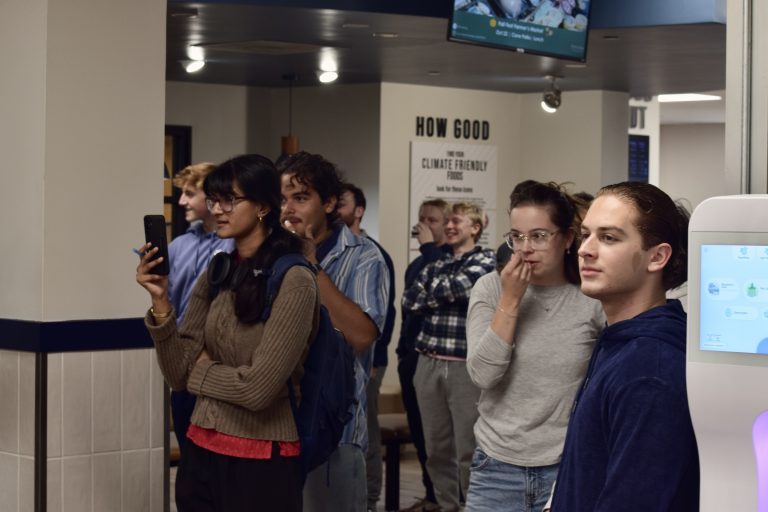Brendan W. Clark ’21
Editor-in-Chief
Trinity’s case count rose to 56, adding an additional 11 positive, confirmed cases since Monday, Oct. 12. This continues a pattern of significant increases that has occurred since an outbreak was first reported on Oct. 5, tied to off-campus athletic housing and residences.
The College did not update its alert level from “orange” and has previously declined to indicate a case threshold that would lead to a shift to “red.” Despite this increase, in an email to the community Thursday morning, DiChristina indicated that the College was “very hopeful” that “we will be able to resume in-person classes the week of October 19.” In-person classes have been suspended since Oct. 5, when the outbreak began.
Trinity previously increased its case count by 24 cases Saturday evening to 45, adding an additional 2 cases Monday morning.
DiChristina suggested that “nearly all of the new cases from the last three days have come from students who were in quarantine.” It was not immediately clear how many cases were not from those in quarantine and represent new, independently confirmed cases on campus.
The Tripod has learned that several of the infected students had all visited Parkville Market, an off-campus food hall in the Parkville region of Hartford.
The Tripod spoke with Marketing, Sales, and Events Manager Kelly Even and Director of Operations Chelsea Mouta Tuesday afternoon, who confirmed that the market had “not been contact traced by the College.” Even also indicated that, following the first uptick in cases in September, Parkville and the College had discussed “partnering, but wanted to put that on pause because of the rising cases.” Students have been previously directed to not leave campus for non-essential reasons, an order that DiChristina previously acknowledged lacks a “legal basis” for enforcement. The College also declined in August to “regulate use” of vehicles and has placed no restrictions on student vehicles on-campus, in contrast to other NESCAC schools who have sharply reduced student access to vehicles.
These new cases, DiChristina noted, demonstrates that the “virus can spread quickly in higher-density living environments” and suggested that this is “consistent with trends as reported by state and national public health experts.” The College had previously declined over the summer to regulate higher density living environments, such as Greek Life housing. Trinity’s coronavirus case totals are significantly higher than those at any other NESCAC institutions, including Tufts, as the Tripod reported earlier this week.
Chief of Staff to the President Jason Rojas, on Wednesday, declined to allay concerns regarding the College’s conflicting communications to Resident Advisors (RAs) last weekend, when infected students were placed on the same floor as non-infected students in the Stowe and Clemens dormitories. Rojas noted that the College “appreciate[s] the concerns” of RAs but indicated that because of their “employee-like status with the college it’s not appropriate to discuss personnel matters.” Rojas also stated—without acknowledging any conflicting reports—that it would be “more productive for RA’s [sic] to share their concerns or requests for additional information” directly with administrators.
The Tripod also received an email from Dean of Student Life Jody Goodman sent to Clemens residents which indicated that infected students were moved Tuesday and “did not leave the location without the presence of our staff.” It remains unclear what prompted the move, but the College noted that “there is only one apartment in Clemens” that will be used “if absolutely necessary.”
In the email, Goodman also indicated that a complete “review of all mechanicals” had occurred and Clemens’ mechanicals were “in proper working condition.” Goodman continued, noting that the rooms also had “proper ventilation.” Goodman stated that this “review gave us a high level of certainty on how to use the spaces” but did not explicitly address HVAC systems. The Tripod had previously requested this information in an unreturned inquiry Sunday evening.
Goodman also noted that the College will “continue to use other locations prior to using your residential area,” noting that infected students would first be isolated in Stowe prior to Clemens. It remained unclear if Clemens had been utilized again given the recent increase in the size of the outbreak.
DiChristina’s email indicated that “identification is a critical part of the mitigation process” and noted that the College’s contact tracers,” trained through the Connecticut Department of Public Health,” identified many of the additional cases.
The Tripod reached out to Rojas and DiChristina Thursday morning for comment. The College has not responded to a separate Tripod inquiry on the College’s isolation plan sent Sunday evening, though they did reply to requests a week later on Saturday, Oct. 18.








+ There are no comments
Add yours